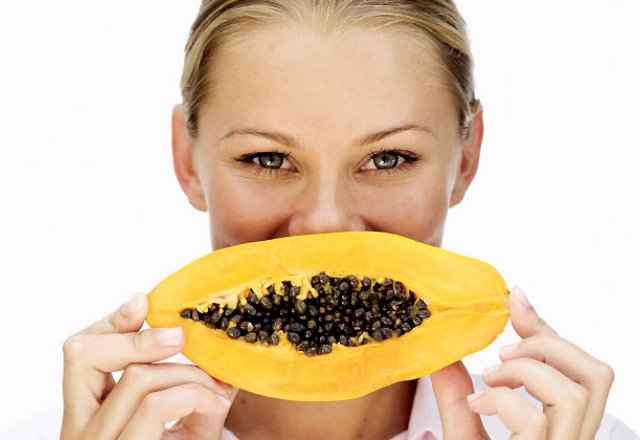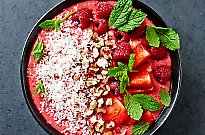
How to prevent bloating

A Low FODMAP diet could be the answer
Turn your attention to your tummy. How is it feeling? Any pain, bloat, emptiness, heaviness or gas? Weak digestion breeds disease, writes Caroline Robertson. If the Low FODMAP Diet isn’t for you, then why not add these belly boosters to your everyday diet for a great gut?
The lowdown
Think of your digestion as a long disassembly line. As food travels along the gut, it gets broken down into usable bits then absorbed and utilised for energy, repair and growth. Unusable trash is dumped in the toilet. However, incompatible allergens can also stay in your system and create immunity havoc. Food intolerance is apparent when items incite unpleasant feelings.
These may be really obvious symptoms such as acid reflux, bloating, nausea, cramps, diarrhea, asthma, rashes, sinusitis or swollen glands. Or they can be subtle signs such as fatigue, headache, confusion, irritability and dizziness. Along with identifying and eliminating major allergens, try incorporating foods that heal, soothe and stimulate your digestive system. The following tummy treats enhance optimal metabolism, nutrient absorption and waste evacuation while minimising post-meal moans. Taken over time, they can empower you to digest more foods without uncomfortable consequences, shortening your food allergy list and even overcoming it.
Enzymes for assimilation
As food passes through each digestive pit stop, specific enzymes act on it. Enzymes are proteins that are chemical catalysts in the body.
According to food enzyme researcher Dr Edward Howell, “Without enzymes, no activity at all would take place. Neither vitamins, minerals or hormones can do any work without enzymes.”
Up to 300 enzymes are essential to convert food into a useful molecule. They’re necessary to produce energy, reduce inflammation, fight infection, dissolve clots, regulate hormones, slow ageing plus facilitate fat, sugar and toxin metabolism. Our storage of enzymes are depleted by diarrhea, inflammation, pharmaceutical drugs, sugar, organ weakness and negative emotions. According to some studies, every 10 years, our body’s enzymes decrease by 13 per cent. Chewing well increases enzyme action and taking apple cider vinegar increases the hydrochloric acid required for enzyme activation.
Try these foods:
Most fermented and raw foods are enzyme rich, including the following enzyme elixirs:
Papaya is rich in papain, a proteolytic enzyme that powers protein digestion.
Raw pineapple contains bromelain, an amazing enzyme that reduces inflammation and digests proteins.
Sprouts are alive with hundreds of enzymes and are a great garnish for savoury dishes. Sprouts contain lipase to emulsify fats, amylase for carbohydrates and protease for protein digestion.
Avocado contains lipase, which breaks down fats.
Honey, raw and unheated, has the carbohydrate enzyme invertase and antibacterial enzyme glucose oxidase.
Nuts contain lipase, which clears body fat. Soaking nuts in lightly salted water overnight, then drying them, reduces enzyme inhibitors (lectins and phytic acid) and activates enzymes.
Stimulants for digestion
Digestive stimulants make our mouth, eyes and nose water while warming our body. They enhance the appetite, assimilation and elimination. However, it’s better to avoid them if there’s internal bleeding or stomach acidity. A little can be taken prior to eating thereby igniting the digestive fire to cook food internally.
An Ayurvedic aperitif for this is to soak two thin slices of ginger root in lime juice and a pinch of rock salt. Chew for five minutes before a meal for optimal absorption. The ginger also reduces nausea. Pep up your appetite and metabolism by adding the following stimulants in small doses: lime juice, ginger, black pepper, green chillies, black mustard seeds, garlic, cayenne, paprika, apple cider vinegar, mineral salt, pickle, wine, vermouth, herbal Norfolk punch or Ayurvedic long pepper tonic, Pippalyasavam.
Bitters for fat and sugar metabolism
Bitters boost digestion, banish bloat, reduce fat and balance blood sugar.
The Western palate balks at the bitter taste hence its scarcity in our diet. However, bitter coffee, bitter chocolate and salads like radicchio, endives and cress do their bitter bit. A bite of bitter melon before a meal stimulates digestive secretions like nothing else. Try thin slices shallow fried in coconut oil and lightly salted for healthy chips. Alternatively, a bitter tonic including gentian and dandelion will kickstart your meal. Adding bitter fenugreek seeds and turmeric to dishes such as curry, rice or tea will give them a subtle taste that clears the lymphatics and lowers blood sugar.
Herbs for soothing
A cup of calming tea can clear cramps, constipation and gas. Start your day with a sip of settling fennel seeds, chamomile flowers, lemon balm, peppermint or liquorice. An afternoon cuppa will also digest the day’s diet and induce deeper sleep. Adding anti-gas herbs like cumin, dill, hing, mint and ginger to your meals, juices or smoothies aids absorption and eases gassy indigestion.
Greens for alkalising
The Western diet has caused an acidity epidemic. Acidic items such as meat, grains, dairy, sugar, coffee, alcohol and medications all lower our pH. If you suffer from heartburn, fatigue, pain, ulcers, heavy limbs and inflammation, you may benefit from alkalising foods. Try a green smoothie or regular intake of alfalfa sprouts, spirulina, broccoli, kale, kelp and chlorella. These are also high in betacarotene, vitamins C, E and folate, which protect us from stomach cancer. If you have hyperthyroidism, seek medical advice before increasing your greens.
Probiotics for balancing
All traditional cultures offer fermented specialties. Delicious Japanese miso, natto, tempeh, pickles, Greek yoghurt, Indian dosha, European sour bread and sauerkraut are just some examples of fermented delicacies. These pre-digested dishes contain probiotic microorganisms that banish bad bacteria and heal the gut. Taking prebiotic-rich foods such as bananas, garlic, honey and asparagus fertilises the growth of probiotic flora. Together these treat intestinal gas, infections and candida albicans.
Fibre for elimination
Having clogged up bowels is a terrible, toxic feeling. Prevent getting plugged up by drinking plentiful amounts of pure water and eating fibre-rich foods. If you have delicate digestion, then insoluble fibre in the stems of broccoli and cauliflower can be too irritating, though blending them makes them more absorbable. Try soluble fibre sources such as dates, prunes, figs, carrots, squash, sweet potato, turnips, beetroot, plantains, taro and zucchini. Lubricate your gut lining with flax seed oil for softer stools.
Caroline Robertson is a naturopath, homoeopath and Ayurveda practitioner. She consults and teaches worldwide, specialising in digestion, skin and stress management. For consultations, health retreats or guided meditations please see carolinerobertson.com.au
Beat the bloat with this super green smoothie>>


